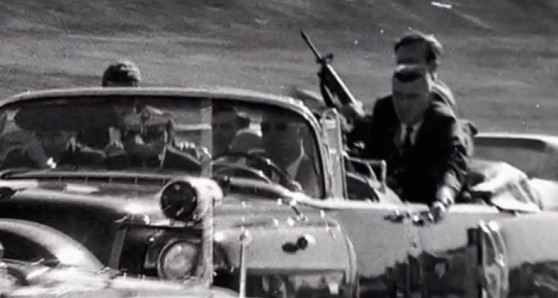Bonar Menninger’s Mortal Error

Screen: Reelz
Like a Magic Eye puzzle, once you see Howard Donahue’s explanation of JFK’s death, you can’t unsee it.
The crime
The murder of John F. Kennedy in Dallas.
The story
Amateur gunsmith Howard Donahue was asked to take part in a televised recreation of JFK’s assassination. His job: to demonstrate whether or not Oswald really could have gotten the three shots off, accurately, in the timeframe described in the Warren Report. It was possible, though it took him a few tries — but the Warren Report got Donahue thinking. Were all of Kennedy’s injuries consistent with the gun, and ammunition, Oswald used? Were the witnesses reporting gunfire from the grassy knoll, or the smell of gunpowder at ground level in Dealey Plaza, onto something — even if it wasn’t quite the right thing?
Had Oswald shot the president, but not killed him?
Donahue’s conclusion, as related by Bonar Menninger’s Mortal Error: the shots fired by Oswald would almost certainly have killed Kennedy, but the shot that caused the ghastly head wound came from elsewhere. I won’t spoil the source of the shot for you, although this information is and has been out there for 20 years, and another book about Menninger’s book — with an accompanying NatGeo special — came out around the half-century anniversary of Kennedy’s murder last year, because one of the pleasures of Menninger’s book is following along with Donahue’s science and having your own “oh! …OHHHHHH” moment.
The other is how direct and determined to stick to provable facts it is. Menninger’s prose is unobtrusive, which may sound like faint praise, but in this genre is a rare gift, and a pleasant break from the usual “HOW CAN YOU NOT SEE, O SHEEPLE” histrionics. As such, it reflects Donahue’s steady, unflappable search for the ballistic truth of the events in Dealey Plaza. Donahue wanted to believe the Warren Report. He wanted to prove that what it said was true; he was asked, in fact, to double-check exactly that.
But he couldn’t — and once he realized what hadn’t happened, what couldn’t have happened, he just kept grinding away at it. He made models of skulls. He pored over aerial photos. He read the cut testimony. He talked to reporters and politely called his congressman over and over.
And the government did what it does best — nothing — and waited for him to go away, probably because it knew he was onto something with his conclusions. It’s rather shocking, at least to me, that Donahue’s explanation of what happened that day hasn’t become the conventional wisdom; once it becomes clear (which is fairly early on, but don’t worry; the rest of the book isn’t repetitive), you probably won’t be able to unsee what he’s showed you.
The explanation holds up; so does the book. Menninger is deceptively skilled, not overwriting but untangling the many contradictory threads of testimony deftly and showing Donahue’s math and methods to their best and clearest advantage. The publisher does take the stage in the last bit of the book, to explain the measures taken to avoid getting run off the libel road by various people or government agencies, and that too is brisk and helpful.
A solid read even if you don’t buy into Donahue’s theory (or have much background in the case), Mortal Error is the unicorn of JFK books: believable and calm.
This article also appears at The-Blotter.com.
Tags: Bonar Menninger books Howard Donahue John F. Kennedy Lee Harvey Oswald The Blotter true crime






I’d read this theory from Bill James’s book, which given the original pub date of the Menninger, I’m guessing is where he sourced it. I agree it’s weird that reasonable people are all ‘lalala I can’t hear you’ about it. I guess it ruins too many other theories, which we can’t have!
I was literally just about to comment “is it the theory Bill James put forth in his book?” Now doing some Internet Research (TM), I see that James cited Mortal Error as essentially the source of his opinion. Derp.
It’s free for your Kindle this month if you are an Amazon Prime customer. I tore through the first five chapters last night after reading Sarah’ review.
Just finished reading “JFK: The Smoking Gun” by Colin McLaren, who also concurs with the Donahue conclusions. I actually came to see if that was the book I remembered you reviewing. McLaren became really interested in the case as a result of reading Menninger’s book and comes at it from the perspective of a retired detective, following witness statements and as many original reports as possible.
Now I’m going to have to find Mortal Error as well – fascinating reading.